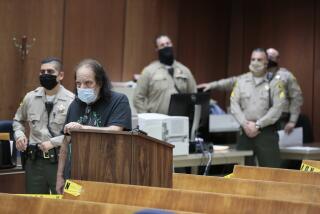Mentally Disabled Woman to Donate Marrow : Courts: Ruling honors family’s request to allow the 39-year-old to help save her sister, who has leukemia.
- Share via
ORANGE — A 39-year-old woman who is severely mentally disabled will be allowed to donate bone marrow in an attempt to save her dying sister, an Orange County Superior Court judge ruled Wednesday in what is one of the first such cases decided in California.
Judge John C. Woolley concluded that Patricia Bourke, who has the mental capacity of a 3-year-old and lives in a Buena Park nursing facility, would benefit from the procedure although she does not understand the significance of her gift and fears the physicians.
Fear can be alleviated, Woolley said, but the very survival of Bourke’s sister, Kathleen Spence, 53, of Huntington Park, who has acute leukemia, hinges on her receiving genetically matched bone marrow that only Bourke can provide.
Woolley had been asked to approve the procedure by Bourke’s 80-year-old mother, Frances Bourke, and brother, Joseph Bourke, 51, who are her legal conservators.
Woolley said his highest priority was “the best interest” of Patricia Bourke. But he also said he was moved by Kathleen Spence’s plight.
The judge conceded that Patricia Bourke may greatly fear the medical procedures she faces. “At the same time,” he said, “how do you say (to Kathleen Spence) this is your only shot and I’m not going to give it to you?”
A major factor in his decision, the judge said, was that the procedure carried “minimal medical risk.”
The ruling, which is similar to at least one other California case, was based on an investigation of the Bourke family conducted by Jerry von Talge, a licensed marriage and family counselor in Newport Beach. Von Talge reported that Patricia Bourke, despite having lived her entire adult life in an institutional setting, is emotionally attached to her family and would benefit from her sister’s survival.
“She may not understand what the results will be, but she will know that her sister is with her. She loves her family,” Joseph Bourke said.
Woolley said during the medical procedure, if doctors approve, medication should be given to Patricia Bourke to relieve her fear, and that her family should comfort her.
Barbara Mandell, a lawyer representing the family, said Kathleen Spence’s doctors at the City of Hope will move quickly to prepare for the bone marrow extraction. “Time is of the essence,” she said. The transplant, she said, will rebuild Spence’s bone marrow after it is destroyed by chemotherapy.
In his remarks, Woolley expressed concern that mentally disabled people may be vulnerable to medical exploitation.
“Society cannot tolerate a situation that allows a protected class of people to be used as a crop from which organs, body fluids and bone marrow can be harvested,” he said, “because there is no way to tell which person has more value than another. . . . IQ is not the perfect measure.”
He said the decision to allow Patricia Bourke to donate bone marrow, which will regenerate, might have been different if the request involved the donation of a kidney or other organ.
Robin Maisel, a lawyer from Protection and Advocacy, a nonprofit agency that protects the rights of disabled people and represented Patricia Bourke, praised the ruling. He cautioned, however, that “each case must be handled individually and on its own facts. The family situation, the mental capacity of the conservatee and whether medical alternatives are available must all be weighed in the balance.”
Maisel said the issue may never have come to the courts’ attention if it had not been for the nursing home, which alerted the advocacy group. Patricia Bourke’s mother was under the impression that she could authorize a bone marrow transplant without court approval and had ordered blood tests, her lawyer said.
“I’m sure there are many physicians and conservators who proceed with bone marrow donations and other kinds of medical procedures without seeking court approval, although such decisions should be made in a court of law,” Maisel said.
More to Read
Sign up for Essential California
The most important California stories and recommendations in your inbox every morning.
You may occasionally receive promotional content from the Los Angeles Times.












